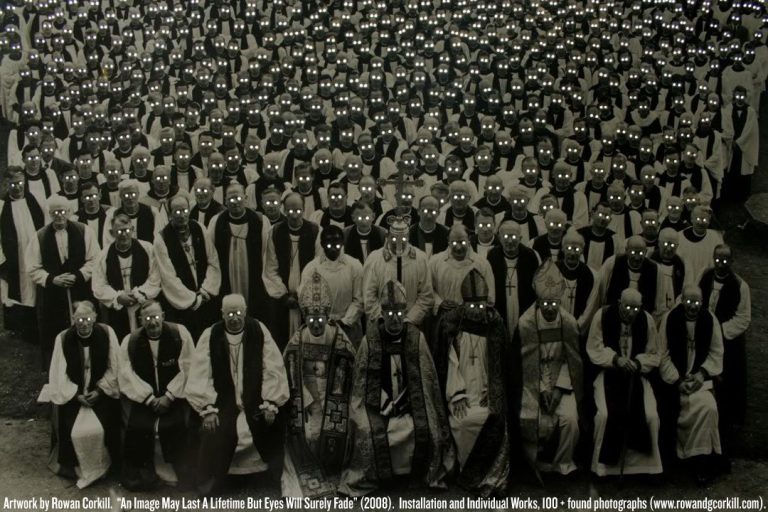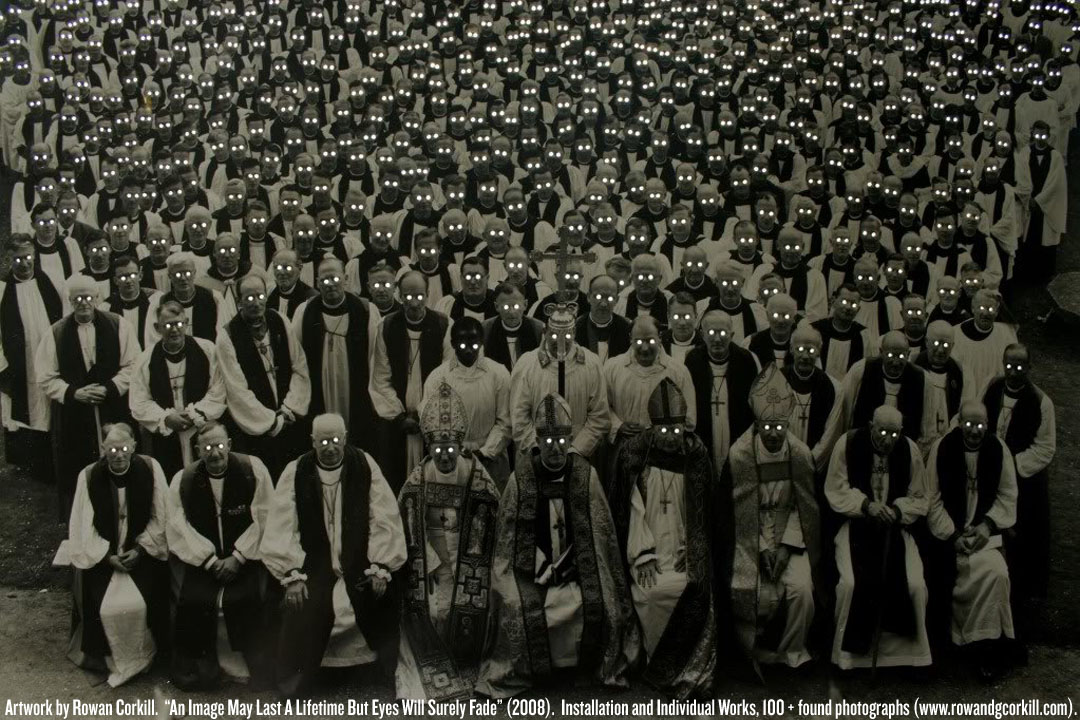First published in The Daily Beast (March 8, 2013) by Robert Shrum ☛ It was so like the Curia: distressed by leaks to the Italian press from Italian cardinals about the machinations of electing a new pope, the hierarchy muzzled the Americans. U.S. cardinals were ordered to stop holding press conferences every day, in which no secrets were revealed, but prelates at least talked openly about the needs of the church. Simultaneously, Vatican insiders were alleged to be cassock-rushing the conclave with the aim of holding on to both the papacy and their own power. Cardinals not permanently ensconced in Rome were pushing for more time to take a broader measure of each other.
I hope that when the cardinals finally enter the Sistine Chapel to choose a successor to Benedict XVI, they will comprehend that nothing so became his papacy as the manner of leaving it. I’m not referring to the helicopter that whisked him away—an image so at odds with his richly venerable Renaissance appearance after he took the Medici vestments out of 16th-century mothballs. At least the Pope, with a measure of genuine humility, at the end affirmed that the papal office is just that — the position, not a person anointed permanently through debility and even unto death. It was the most striking, uncharacteristically progressive decision of his reign.
Otherwise, Benedict left the church weaker not stronger, more remote from the people in the pews, frayed at the center, in decline in the heartlands of Europe and North America, and languishing even in the most Catholic all continents, South America. The decline is the consequence of Benedict’s rule and the decades-long dominance of his predecessor, John Paul II, whose genius in communication concealed or excused his inquisitorial absolutism. The official church, the top-down governance imposed from an eyes-wide-shut Vatican, is incompetent, insular, intolerant, and in thrall to the narrowness of the two popes who have appointed every single one of the cardinals who will determine for whom the white smoke will now rise over Saint Peter’s.
The incompetence is beyond dispute. The Vatican Bank, a fount of scandal for 40 years, is being investigated for money laundering. Thanks to the pope’s butler and Lord knows who else, VatiLeaks revealed a pattern of unholy intrigue and backstabbing in the Curia, wide-ranging allegations of corruption, a back-scratching overpayment of $350,000 for a nativity scene, and a bribe to secure the burial of a Mafia operative alongside cardinals and popes. And don’t forget that this Curia let the pope go off the rails when he delivered a disastrous speech quoting a medieval Byzantine emperor’s statement that Islam brought nothing but “evil” to the world — and then when he lifted the excommunication of a Holocaust-denying schismatic bishop. Chicago’s conservative Cardinal Francis George says that the next Pope has to“face [up to] reform of the Curia.” That verdict is widely shared among the prelates who aren’t hunkered down in a Curia that is more Roman than Catholic, a self-referential bureaucracy that is more maladroit than managerial.
An Italian journalist who follows the Vatican closely told me that “if this were any other institution, it would be out of business.” Of course, it has survived a two-millennium journey of many missteps and misdeeds. But a scriptural guarantee that it will endure is not an invitation to cling to old and failing ways — and to let God take care of the rest.
Yes, Britain’s scandal-plagued Cardinal Keith O’Brien has been told to stay home. But this is still a hierarchy intent on cover-up. As The Guardian reported, four men, including three active priests, who came forward to accuse O’Brien “were asked to make sworn, signed statements. But they also were warned that if the complaints became public knowledge, they could cause ‘immense further damage to the church.’” It was only after the press discovered and published the story that Rome accepted — that is, forced — O’Brien’s immediate resignation and barred him from the conclave, where presumably, stunningly he otherwise would have been a papal elector despite the charges against him. (There was a bonus here for the reactionaries in the Curia: just days before, O’Brien had said he would be “happy” if priests could marry.)
The insularity extends to the “papabile” — the roll call of possible, even likely popes. Cardinal Peter Turkson of Ghana, an early odds-on favorite, blames the abuse on gay priests — although pedophilia is not a function of sexual orientation and the abuse has afflicted girls as well as boys. But the scapegoat is convenient — and the rationalization is complacent. As Turkson explained, because “homosexuality is not countenanced in Africa …[this] has served to keep abuse out.” He’s almost certainly in for a surprise. Think of the European prelates who once smugly wrote off the clerical assaults on children and adolescents as an exclusive American problem.
This is especially true of the child-abuse crisis; the church’s dereliction here is not merely a matter of incompetence, but of a protective and privileged insularity. Priests who preyed on children have been shielded, and so have bishops who looked away; indeed some of them are voting in the conclave. Turkson also has apparently defended or apologized for repressive laws in Africa such as Uganda’s so-called kill-the-gays bill. The joy of the first black pope in centuries would soon be confounded by the reality of someone who has treated child abuse as an excuse for discrimination and who has enabled extreme forms of homophobia. Or think of another papabile, Honduran Cardinal Andrés Rodríguez Maradiaga, who once suggested that “Jewish interests in the media pushed for expansive coverage of the church’s sex scandals.” Imagine if he were the one who stepped out on Saint Peter’s balcony after the cardinal deacon intoned: “Habemus papam.”
As the conclave commences, theologians should be permitted to explore such questions as married priests. The Vatican already countenances married clergy in Eastern Rite churches and for Anglicans who convert to Catholicism. And what about the case for women priests, the role of American nuns who have been assailed by Rome—and yes, the equality of all God’s children, gay and straight? Ross Douthat, a New York Times columnist who applauds “the Ratzinger legacy,” has written that this pope “did stabilize Catholicism, especially in America.” Yet ex-Catholics, 22 million of them, are now the second- or third-largest denomination in the United States. And according to the new CBS–New York Times poll, those who remain, nearly 70 million, are looking not only toward a new pope, but a renewed church: 54 percent “would like the next pope to change to more liberal teachings”—and only 37 percent want to stick with Benedict’s line or move rightward. By wide margins, even the most observant Catholics, who attend mass every week, favor married priests, women priests, artificial birth control, and condoms to combat HIV/AIDS; 74 percent believe you can be a good Catholic while disagreeing with the pope even on abortion.
What chance then is there for any change in a conclave in thrall to Benedict and John Paul? By conventional reckoning, it is very little. Catholics may just have to endure, even as reform doesn’t prevail. But of course, there is the now fading memory of the election that followed the long pontificate of Pius XII. The surprise choice was the gregarious rotund 77-year-old patriarch of Venice. Intended to be a placeholder, no one suspected he would do anything of consequence. Then another surprise: he adjured the name “Pius XIII” in favor of his father’s, John. There was something unexpected here. The new pope soon struck the phrase “perfidious Jews” from the Easter liturgy. Then he suddenly summoned the Vatican Council II, whose reforms the Curia and recent popes have in effect sought to roll back.
On the opening day of the council, John spoke of “people, who though fired with a commendable zeal for religion, are lacking in sufficient prudence and judgment … They see nothing but calamity and disaster in the present state of the world … We feel we must disagree with these prophets of doom, who are always forecasting worst disasters, as though the end of the world were at hand.” He could have been describing — he probably was — a church incompetent, insular, intolerant, in thrall to fear and the heavy hand of the past. He may be an exception, but his example proves that grace can confound the expectations and machinations of curial politics. This time it could; some time it will.
You can follow The Daily Beast on Facebook and Twitter. Robert Shrum, a senior fellow at NYU, was a longtime political consultant who worked on numerous Democratic campaigns, including Kerry-Edwards in 2004 and Al Gore’s 2000 race for the White House.
SEE ALSO: The Rising Power & Influence Of Secular Humanism And The Free Thinker
SEE ALSO: Are We Born With Morality? Watch “60 Minutes” Incredible Report From Yale
SEE ALSO: Americans Love God More & More, But Millions Ditching Dogmatic Religions For Common Sense & Love




